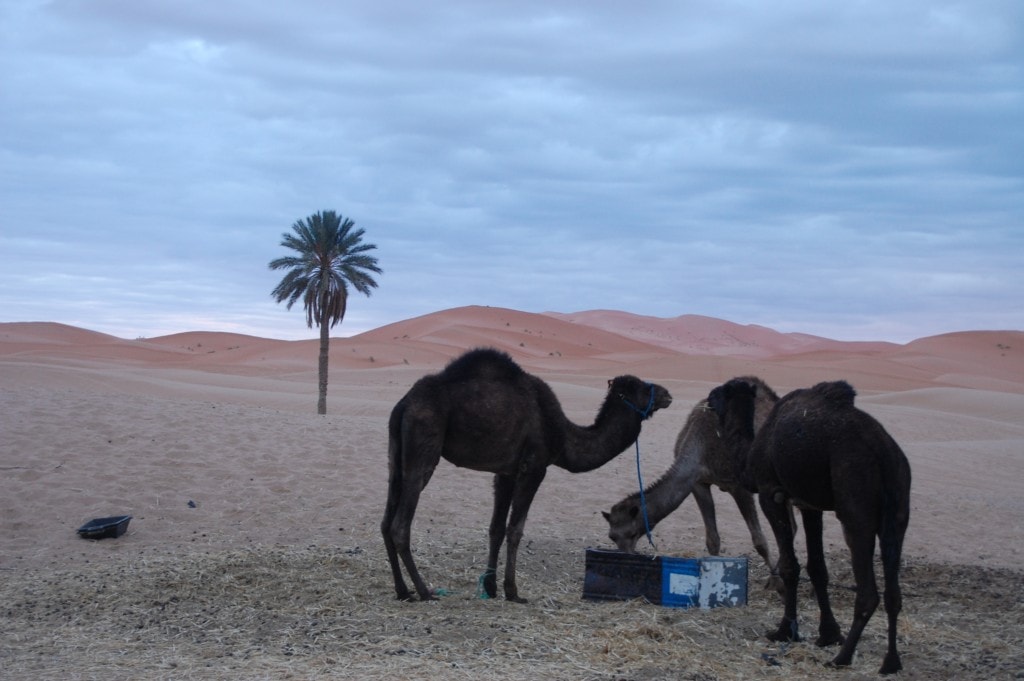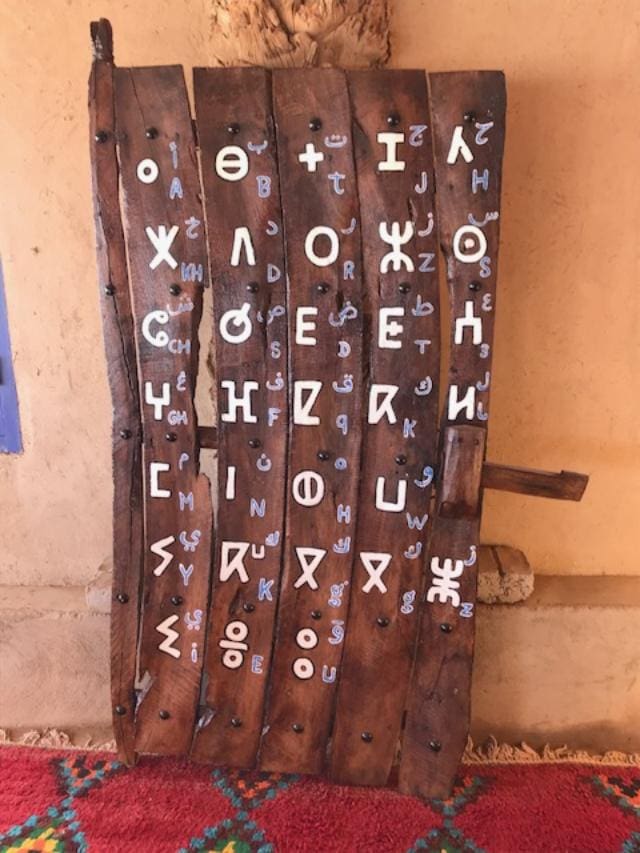When motoring through the ancient Roman ruins of Volubilis, navigating hair pin turns over the snowy, high Atlas Mountains and off-roading across the blush, undulating sand dunes of Erg Chebbi, silence uttered no voice inside our hardy, four-wheel drive Land Cruiser. This was a road trip, for goodness sake, and what road trip is complete without a proper soundtrack? Thank goodness for our driver, Moktar, whose North African Desert Blues playlist could not have been a more perfect companion during our 14-day excursion across Morocco. I’m no musician, but I love music and this genre opened up a whole new world of haunting melodies, hypnotic rhythms, and heady riffs.
African Desert Blues finds its roots deep in the Sahara, particularly Mali, Niger, Libya, Algeria and Burkina Faso. Berber tribes, including the Tuareg, have a long history of nomadic lifestyle that abruptly came to a halt with the onset of colonialism, its aftermath and several rebellions thereafter. Gravely marginalized with new borders where there were none, various tribes and clans of North Africa have faced drought, oppression, unemployment and more recently, Jihadism. These struggles provide more than enough fodder to ignite the birth and spread of a unique musical genre that stems from traditional African beats, Arab pop, western rock and the heart-rending ballads of a suffering people, the American blues.

The late Ali Farka Touré could be considered the father of Desert Blues dating back to the 1950’s, when he started playing the monochord, which would form the basis for his guitar playing, as well as his violin and bamboo flute performance. Throughout the latter part of the twentieth century, he recorded and toured on and off in Europe and Africa, but always returned to his rural roots of Mali. While not everyone has heard of Touré, there are a few of us who aptly recall his seductive, spell-binding song, “Ai Du”, that deliciously stole a scene in the sizzling thriller, “Unfaithful” starring Diane Lane, Olivier Martinez and Richard Gere.

Born in northwest Mali, Touré’s first love was the land he farmed. He would go on to live a dual life as both an agriculturist and world-renowned guitarist. Touré sang in multiple local languages such as Songhay, Fulfulde, and Tamasheq and his lyrics invoked the need for education, land stewardship, health and civil rights. The grandson of traditional healers, his songs also touched on the spirit world and the blessed gift of music they had bestowed on him. In true nomadic form, Touré explored collaborative projects well beyond his desert homeland which included recording albums with Ry Cooder, “Talking Timbuktu” and Toumani Diabate, “In the Heart of the Moon.” Both records earned him Grammys in 1994 and 2005 respectively. The third Grammy was awarded posthumously in 2010 when impromptu sessions with Toumani again were recorded under the title “Ali and Toumani”. Thankfully, his son Vieux Farka Touré, continues to play and record in the same gentle, rocking rhythm that mimics roaming across open savannahs, gazing at an infinite, indigo night sky, or following the ever-shifting sands of the Sahara.
Next on the playlist is Tinariwen, a band from Mali that originated in Algeria and is known for “trading guns for guitars”. Founded by Ibrahim Ag Alhabib, the band also spent time living in exile illegally in Libya while creating their unique sound. Songs were surreptitiously recorded on blank tapes and circulated throughout the Saharan region by hand. At the command of Colonel Ghaddafi, who was recruiting Tuaregs for his army, the musicians received months of military training which they put to use a few years later in support of Tuareg rebel movements. Tinariwen returned to Mali in 1991 and the ‘desert boys’, as they came to be known, rapidly gained popularity playing for Tuareg communities, radio programs and eventually festivals. Tuareg rebellions continued in 1990 and 2012, followed by an Islamic insurgency that forbade music, especially the guitars of the Tuareg. The Islamic militants actually kidnapped one of the Tinariwen members who was later, thankfully, released.
Lyrics within their repertoire echo the struggle of the broader Berber people’s economic and political challenges within the Sahara region, even among their own clans. In “Imidiwan ma tennam” (What Have You Got to Say, My Friends?) they sing,
‘What have you got to say, my friends, about this painful time we’re living through?
You’ve left this desert where you say you were born, you’ve gone and abandoned it.
We live in ignorance and it holds all the power
The desert is jealous and its men are strong
While it’s drying up, green lands exist elsewhere
We live in ignorance and it holds all the power’
Tinariwen today is composed of several band members, old and young, who come and go due to the nomadic lifestyle meaning that no concert brings the exact same line up of musicians. Islamic militants continue to wreak havoc in Mali, leading many band members to take up residency in nearby states. But like most Berber tribes, Tinariwen appears to be allergic to adversity and any other obstacle coming between them and their music.
Lastly, our Saharan tour takes us to Bombino, aka Oumara Moctar, also a Tuareg but born in Agadez, Niger. Like members of Tinariwen, Bonmbino spent time in exile in Algeria before returning to Niger, but Bombino’s band members were not so lucky. Later in 2007, when rebellions erupted again, two of Bombino’s musicians were killed by government forces. He then fled to Burkina Faso fearful of the Nigerian Army who considered his guitar and lyrics of unity deadly weapons.
His love for playing guitar began at 11 when, rumors have it, he took a page from Ali Farka Toure’s book as well as that of Jimi Hendrix. No doubt at 39 he shreds on his six-string, creating songs that highlight the dispossessed of his birth nation and other migrants moving through North Africa in pursuit of a better life. Bombino returned to Niger in 2010 when the conflict came to an end and recorded his famed album and documentary, “Agadez”, a year later thanks to film producer Rob Wyman. He has since gone on to record three more albums (for a total of six), the last of which, Deran, was nominated for a Grammy in 2019. A vehicle for peace, Bombino’s guitar helps spread messages of cultural heritage, the mystical splendor of the desert and the value of education.
Several North African tribes have origins in oral history so it’s easy to see the link between century old stories shared around a fire and the local blues sung by these nomadic tribes. Like the repeating riffs played on a blues guitar, the familiar themes of persecution and environmental degradation carry on from one generation to another. Like Bombino sings in his song, ‘Imidiwan’
‘Let us not forget this heritage
That our parents have left us
Let us keep it fondly
This heritage is our identity’
Thanks to those who brought these voices to the world stage, we as listeners are now aware of the fates and struggles of a community otherwise overlooked. So take a moment to scroll through your music selection and twenty francs says it’s missing an entire category of these bewitching tracks that will instantly transport you to a volatile and yet treasured landscape in search of peace and unity.













